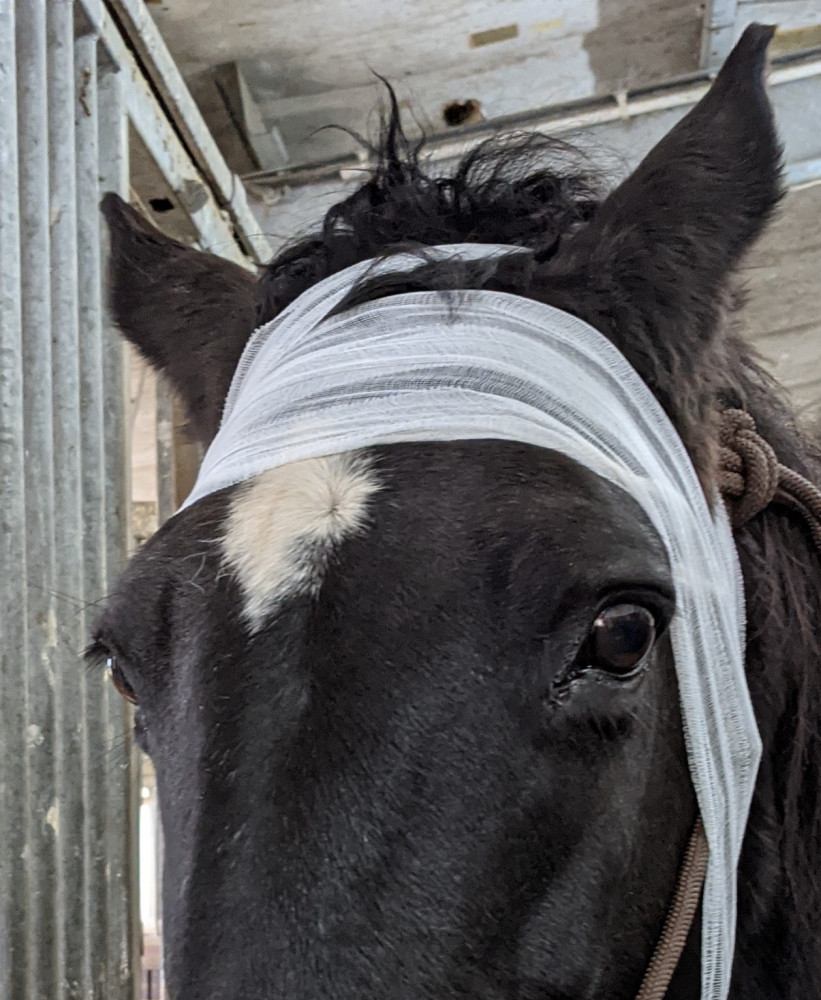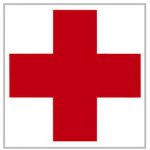Respiratory Disease – Bronchitis and Pneumonia
 Next to lameness a bronchitis or pneumonia is the most common disease for horses.
Next to lameness a bronchitis or pneumonia is the most common disease for horses.
Symptoms need to be noticed very quickly so that a vet can give medicine preventing a chronic situation of a respiratory disease. If he does not it can cause a dramatic state of health and in worst cases this ends in a recurrent airway obstruction (REO). Then, the capacity of the horse is restricted.
 Breathing – not only for us humans but also for horses is absolutely vital.
Breathing – not only for us humans but also for horses is absolutely vital.
Nevertheless dirty stables, forgotten vaccinations and allergies can cause a respiratory disease. This infects the whole respiration organ what means the bronchus and the lung. Due to a better understanding of the disease at first we describe the normal breathing process so that it becomes easier to understand the possible infections. In general it is indispensable that riders notice if their horses cough which is the most common symptom. In any case a vet needs to examine the horse so that he can give the right type of medicine.
Respiration of a horse
Through the nostrils oxygen enters into the organism of the horse. Possible disturbing particles become filtered by the trachea and the nasal cavity so that the clean oxygen can float on. The trachea ends in the bronchus which is the root of the lung. The bronchia itself is divided into two main bronchia and plenty of bronchioles. These smaller bronchioles consist out of pulmonary alveoli which form the lung tissue. The lung consists out of thousands of these alveoli because they guarantee the most important function of the lung: the gas exchange. This means that oxygen is taken from the air (inhalation) and carbon dioxide which comes from the blood gets emitted from the organism (expiration).
Cough – Symptom and no disease
A disease of the respiration means an inflammation of certain parts of the tissue in the respiration organs. The inflammation stands for a reaction of the tissue: after an exterior factor disturbed it, it reacts in form of an irritation. This irritation is not visible but we can notice it: our horse coughs. This explains why coughing is no disease itself but a symptom for an inflammation of a certain part of the respiration system. One can localize the origin of the cough due to the different types of coughing: loud and barking coughing leads to an inflammation of the upper parts of the respiration system. In opposite to this moist and painful coughing is typical for an infection of the lower parts like the bronchus and the lung. Logically different origins of a disease need different treatment and therapies what stresses the importance of contacting a vet.
Infection of the respiratory tract – origins for a bronchitis or pneumonia
In general a disease of the respiration system can be caused through two different exterior factors: an infection or an allergy. Dirt and molds cause an allergic reaction and in some cases even a chronic situation of coughing. In opposite to this an infection can have three different origins: virus, bacteria and worms. According to the virus especially the flu– and herpes virus are the most often reason for the disease and therefore the cough. A flu virus is transmitted through the air and droplets so that it really is contagious. The herpes virus already infected many horses so that nearly 90 % of the horse population nowadays offers this virus in its organism. If this virus once reached into the organism it stays there until the end of life and appears in certain situations as for example as a result after another immune disease. Nevertheless generally a bacterial infection is the most often reason for a respiratory disease. Indeed it really is difficult to protect your horse from this type of infection because it easily is transmitted by other horses and especially arises in areas of dirt (and there is a lot of dirt in a stable). The third origin for an infection is a lung worm which damages and destroys the lung tissue.
Symptoms for a bronchitis and pneumonia
Pneumonia is the result of a serious bronchitis. Bronchitis ends in pneumonia if the horse owner did not notice the symptoms in time – in this cases pneumonia can even become perilous. This fact underlines the importance of sufficient information about the disease, it origins and symptoms. Additionally it is really helpful to tell the vet all observations of the horse in a detailed way. As already described the first symptom for an inflammation is the cough. At first a horse can only have it from time to time what makes it really hard to notice. In the cause of the inflammation the cough becomes worse and additionally the horse has a high temperature and a worrying health. In this situation the horse can even have a temperature of about 40 degrees (normally a horse has a temperature of about 37, 5-38, 3 degrees). Furthermore they have a purulent nasal discharge. Generally all these diagnosis clearly are symptoms for bronchitis. If horse owners do not notice the inflammation so that the horse does not get any medicine against it, it even becomes worse and quickly results in pneumonia. It is easy to say if a horse has pneumonia or bronchitis: a horse with bronchitis has a high and a horse with pneumonia a normal temperature.
Further symptoms for pneumonia are:
- Less capacity, the horse is exhausted and weak
- Less of appetite
- Partially sweating or shivering
- Increased heart and respiratory rate
- Difficulty in breathing
- A blood screening shows a high quantity of white blood cells (leukocytes)
Chronic situation of a lung disease- recurrent airway obstruction (REO)
The horse is in real danger if a chronic situation of a lung disease ends in a recurrent airway obstruction (sometimes also calles heaves). This means that the pulmonary alveoli are filled with oxygen which cannot stream out the lung. Referring to this the lung is overstretched. The lung is not able anymore to emit the oxygen on its own so that the horse needs its abdominal muscles to support the normal respiration. Due to this extreme performance of the muscles the horse gets a heave line which is located between the abdominal muscles and the costal arch. Until today scientists did not find any cure against this process so that this illness is called irreversible – and has to be prevented in any way!
Prevention of a REO
Undoubtedly the best cure is prevention. If horse owners want to protect their horses the animals may not stand near any potential pathogenes which produce a bronchitis or pneumonia. Due to this all bowls (p.e. watering places) need to be cleaned so that there is no chance for dirt and mold. This fact especially has a great significance if the horse does not stand in an exterior stable because allergies often also can be caused by musty air. Nevertheless usually infections happen via other infected horses in the stable what clarifies that the most important prevention is a regular vaccination. Riders can even support this prevention if they organize a vaccination for all horses in the stable. Additionally a well working and healthy immune system is the base for a successful prevention of any disease. Riders can support this natural prevention in two simple ways: feeding the horse in a healthy and balanced way as well as moving and working it enough. These facts have to be taken serious by any horse owner.
Therapy and treatment by the vet
Generally it is really helpful to describe all your observations in a detailed way to the vet. Referring to this the situation in which the horse coughs may have significance. You can ask yourself the following questions: when does my horse cough? Does he cough when he eats, in certain seasons or when he offers physical exertion? Through these details it will be much easier for the vet to guarantee the right diagnosis. Additionally he will examine the blood screening and auscultate the airways and lung. He localizes the inflammation and prescribes the right antibacterial which mitigates the irritation. In addition to this expectorant substances help to cure the cough. Vets advise an entire immobilization until the complete recovery of the horse. It is indispensible to behave like this because if you do not your horse can get a chronic situation of the respiratory disease.
Surf tips:
- Horses with Copper Deficiency
- Horses with a Lack of Selenium
- Horses with Laminitis- Origin and therapy
- Horses with Liver Disease
- Narcolepsy – If Horses just fall asleep
—All statements without guarantee—



8 Comments
Comments are closed.